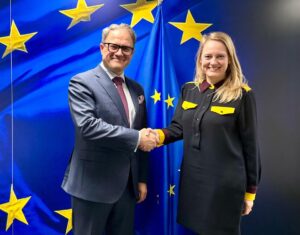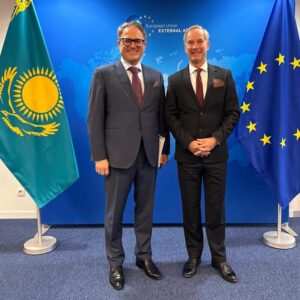ASTANA – Kazakh Deputy Foreign Minister Roman Vassilenko held a series of meetings with representatives of key European Union institutions in Brussels to discuss the prospects for deepening Kazakhstan-EU cooperation and strengthening regional partnerships in Central Asia.

Roman Vassilenko and Viviane Loonela. Photo credit: Kazakh Foreign Ministry.
Discussions focused on priority areas of collaboration, including transport and infrastructure projects, sustainable development, energy partnerships, and the resilience of supply chains, reported the Foreign Ministry’s press service on Feb. 13.
During meetings with Luc Devigne, deputy managing director of the European External Action Service (EEAS), and Viviane Loonela, chief of staff to the EU High Representative for Foreign Affairs and Security Policy, the officials addressed bilateral cooperation, emphasizing political dialogue, economic collaboration, and preparations for upcoming joint events.
Key upcoming engagements were discussed, including the EU-Central Asia Ministerial Meeting in Ashgabat, the first EU-Central Asia Summit in Samarkand, and the Astana International Forum to be held in the first half of 2025.
The meeting participants expressed mutual interest in strengthening engagement in strategically significant areas, such as critical raw materials, green energy, and transport corridors, including the Trans-Caspian International Transport Route.
“The timing of these meetings in Brussels is significant given the broad scope of our cooperation, the dynamic nature of our relations with the EU, the evolving foreign policy priorities of the new European Commission, and the rapidly changing geopolitical landscape. The substantive and positive nature of the discussions reinforces our confidence in the long-term development of our mutually beneficial partnership,” said Vassilenko.
Regional Development and Infrastructure Projects
He also discussed regional development and infrastructure projects with Pēteris Ustubs, the European Commission’s director for international partnerships, and Lucie Shestakova, the EU Commissioner for International Partnerships’s chief of staff. The meetings explored joint projects to develop transport corridors, modernize logistics networks, and promote sustainable energy and digital solutions.
Energy cooperation and supply chain resilience were also the focus of the discussion. The officials exchanged views on advancing green energy initiatives, including expanding renewable energy sources and cooperation in low-carbon technologies.

Roman Vassilenko and Olof Skoog. Photo credit: Kazakh Foreign Ministry.
In a meeting with Olof Skoog, EU Special Representative for Human Rights (who assumes the role of Deputy Secretary-General of the EEAS from March 1), discussions centered on stability and security in Central Asia, as well as constructive cooperation on the rule of law and humanitarian initiatives. Kazakhstan reaffirmed the importance of multilateral collaboration in these areas and expressed readiness to strengthen coordination with the EU.
During a meeting with Giusi Princi, chair of the European Parliament Delegation for Relations with Central Asia, plans were outlined for expanding interparliamentary cooperation between Kazakhstan and the EU. She welcomed Kazakhstan’s ongoing reforms under the leadership of President Kassym-Jomart Tokayev, recognizing their significance for democratic development and greater transparency in governance.
They paid special attention to enhancing parliamentary dialogue, including experience-sharing and maintaining active engagement on key bilateral and regional issues. In this context, both officials stressed the importance of regular meetings and stronger parliamentary diplomacy mechanisms to advance joint initiatives and align legislative approaches.
The meetings reaffirmed the commitment of Kazakhstan and the EU to strengthen dialogue and expand practical collaboration across various sectors. The meeting participants expressed their readiness to continue working on joint initiatives, laying the groundwork for a sustainable and long-term partnership.
Kazakhstan-EU Trade and Investment
The European Union is Kazakhstan’s largest trade and investment partner, accounting for approximately one-third of Kazakhstan’s foreign trade and accumulated foreign direct investment (FDI). Trade turnover in 2024 reached $48.7 billion, with Kazakhstan’s exports at $38.1 billion and imports at $10.6 billion (+36.7%). FDI from EU countries in the first three quarters of 2024 totaled $6.4 billion.
Kazakhstan is the first country in Central Asia to sign an Enhanced Partnership and Cooperation Agreement (EPCA) with the EU, covering 29 areas of cooperation, including international and regional security, trade, investment, infrastructure development, innovation, culture, sports, and tourism.
More than 3,000 companies with European capital operate in Kazakhstan, including major multinational corporations such as Shell, Schneider, Eni, Total, Air Liquide, Alstom, and Siemens.
